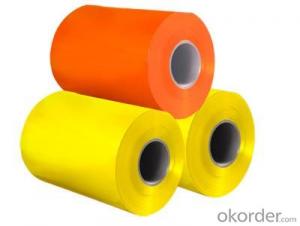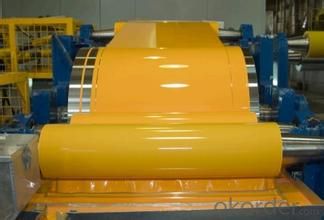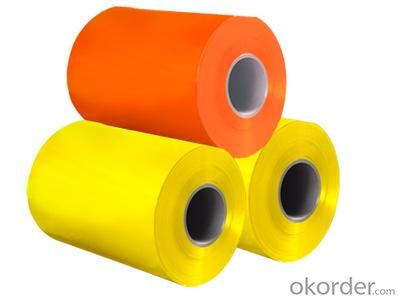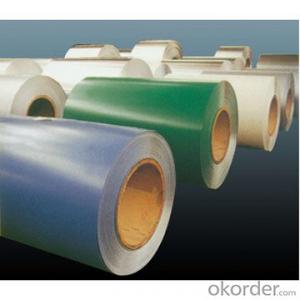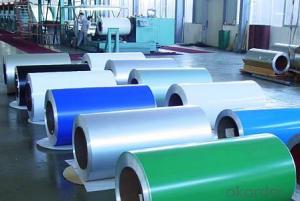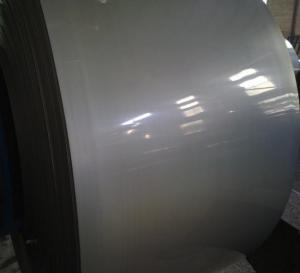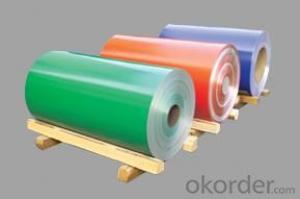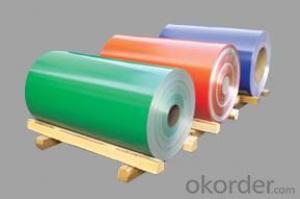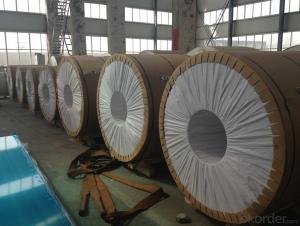Pre painted aluminum coil,roll
- Loading Port:
- China Main Port
- Payment Terms:
- TT OR LC
- Min Order Qty:
- -
- Supply Capability:
- -
OKorder Service Pledge
OKorder Financial Service
You Might Also Like
Aluminium is a relatively soft,durable, lightweight, ductile and malleablemetalwith appearance ranging from silvery to dull gray, depending on the surfaceroughness. It is nonmagnetic and does not easily ignite. A fresh film ofaluminium serves as a good reflector (approximately 92%) of visible light and an excellent reflector (asmuch as 98%) of medium and far infrared radiation. The yield strengthof pure aluminium is 7–11 MPa, while aluminium alloys have yield strengths ranging from200 MPa to 600 MPa. Aluminium has about one-third the density and stiffness of steel.It is easily machined, cast, drawn and extruded.
Aluminium alloys (or aluminum alloys; see spellingdifferences) are alloysin which aluminium(Al) is the predominant metal. The typical alloying elements are copper, magnesium,manganese,silicon,tin and zinc. There are twoprincipal classifications, namely casting alloys and wrought alloys, both of which are furthersubdivided into the categories heat-treatableand non-heat-treatable. About 85% of aluminium is used for wrought products,for example rolled plate, foils and extrusions.Cast aluminium alloys yield cost-effective products due to the low meltingpoint, although they generally have lower tensile strengthsthan wrought alloys. The most important cast aluminium alloy system is Al–Si,where the high levels of silicon (4.0–13%) contribute to give good castingcharacteristics. Aluminium alloys are widely used in engineering structures andcomponents where light weight or corrosion resistance is required
Features:
1. Excellent quality of products
2. Quick delivery
3. Best service to clients
4. BV,SGS avalible
5. No buckle o waveness
6. Tension leveling
7. Certificate of Origin
8. Form A,E
Packaging Detail: Carton ,Wooden pallet with plastic protection packing,standard seaworthy packing or as your request.
ProductionCapacity:
AnnualProduction capacity of 600,000 tons.
Products areexported to United States, Canada, U.A.E, Brazil, Mexico,Thailand, Vietnam,Nigeria etc, over 100 countries andregions all over the world.
Coveredfactories with full production line
CNBM aluminumproduction base is comprised of 18 aluminumannealers, 10 coil and foilmills, 4 continuous production lines, 2hot rolling production line and 3prepainted lines.
FAQ:
1. What is the form of payment?
Normally 30% TT, L/C
2. Type of quotation?
FOB, CFR, CIF
3. Port of loading?
Shanghai port
4. Delivery time?
30 day after client’s deposit
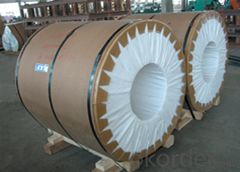
- Q: Can aluminum coils be used in the production of aluminum siding?
- Yes, aluminum coils can be used in the production of aluminum siding. The coils are typically rolled into sheets and then cut and shaped to create the desired siding profiles. Aluminum coils are commonly used in the manufacturing process due to their durability, lightweight nature, and resistance to corrosion, making them an ideal material for siding applications.
- Q: Explain the key differences between aluminum coil welding and soldering processes.
- <p>Aluminum coil welding and soldering are two distinct methods used in metal joining. Welding involves the fusion of aluminum coils using heat to create a strong bond between the metals. This process can be done with various techniques such as MIG, TIG, or laser welding, and it results in a permanent joint. Soldering, on the other hand, is a process that uses a filler metal with a lower melting point than the base metal (aluminum in this case) to join the materials. The joint is not as strong as a welded joint, and the process does not involve melting the base metal. Soldering is often used for electrical connections or when a less permanent bond is required. In summary, welding creates a stronger, more permanent bond by melting the base metal, while soldering uses a filler metal to create a less permanent bond.</p>
- Q: What are the different surface finishes available for aluminum coils?
- There are several different surface finishes available for aluminum coils, including mill finish, brushed finish, embossed finish, anodized finish, and painted finish.
- Q: This question seeks to understand the various types of aluminum coils that are commonly found in the market.
- <p>Aluminum coils available on the market today can be categorized based on their properties and applications. These include: 1. Plain Aluminum Coils: Used for general purposes like packaging and construction. 2. Embossed Aluminum Coils: Feature a textured surface, used in decorative applications. 3. Alloy Aluminum Coils: Made from a mixture of aluminum and other metals for enhanced strength or corrosion resistance. 4. Color Coated Aluminum Coils: Coated with paint or plastic for aesthetic or protective purposes. 5. Heat Treated Aluminum Coils: Processed to improve their mechanical properties. 6. Mirror Finish Aluminum Coils: Have a highly reflective, polished surface. 7. Pre-painted Aluminum Coils: Coated with a layer of paint before being used in construction or other applications. Each type serves specific industries and applications, with variations in thickness, width, and alloy composition.</p>
- Q: What are the standard widths of aluminum coils?
- The specific industry and application play a role in determining the varying standard widths of aluminum coils. Generally, aluminum coils come in widths ranging from 12 inches (30.48 cm) to 60 inches (152.4 cm). These widely accepted widths are commonly utilized in construction, transportation, and manufacturing sectors. It is worth mentioning that customized widths are also readily accessible to meet specific project needs in the market.
- Q: Can aluminum coils withstand high temperatures?
- Yes, aluminum coils can withstand high temperatures. Aluminum has a relatively high melting point of approximately 660 degrees Celsius (1220 degrees Fahrenheit). This makes it suitable for applications that involve high-temperature environments. Additionally, aluminum has excellent thermal conductivity, which allows it to dissipate heat efficiently. This property makes aluminum coils commonly used in heat exchangers and various heating applications. However, it is important to note that the specific temperature limit for aluminum coils may vary depending on the specific alloy and application.
- Q: aluminium plate - 1800mm x 950mm x 1.5mmprocesses - i) sandblasting ii) polyethylene coating iii) matt blastingWhy does aluminium plate warp after the first process?How to prevent warping? Other than increasing material thickness (weight issue)
- I don't know about aluminium or metallurgy but I have direct experience of grinding and lapping silicon wafers for the integrated circuit industry. I know that these grinding-type processes (and I think sand blasting may be similar) will introduce stress on the machined side of a thin silicon plate. The damage affects the atomic scale silicon lattice (aluminium will be similar only it may be polycrystalline as opposed to the single-crystal lattice with which I am familiar). This stress acting on one side of the plate causes the plate to bend or warp. For the theory behind plate bending due to stress try googling Stoney's equation. Note that this stress and usually the warpage might be removed by performing the same operation on the opposite side of the plate (the stresses induced then cancel each other). For silicon we can also reduce or remove the stress by polishing away the machined surface.
- Q: How are aluminum coils coated for corrosion resistance?
- Aluminum coils are coated for corrosion resistance through a process known as coil coating. This involves applying a protective coating onto the surface of the aluminum coils to prevent oxidation and corrosion. The coating is typically a combination of primer and topcoat that is applied using various methods such as coil coating lines or spray applications. The coating acts as a barrier, protecting the aluminum from environmental factors such as moisture, chemicals, and UV radiation, thereby enhancing its durability and extending its lifespan.
- Q: Are aluminum coils more expensive than other coil materials?
- Yes, aluminum coils are generally more expensive than other coil materials. This is mainly due to the higher cost of producing aluminum compared to other metals, such as copper or steel. Additionally, aluminum coils are known for their superior corrosion resistance, lightweight nature, and high thermal conductivity, which further contribute to their higher price point. However, it's worth noting that the cost can vary depending on factors such as the thickness, size, and specific application of the coil.
- Q: Are there any limitations on the welding or soldering of aluminum coils?
- Yes, there are limitations on the welding or soldering of aluminum coils. Aluminum is a highly reactive metal with a low melting point, which makes it challenging to weld or solder compared to other metals. One limitation is the formation of oxide layers on the surface of aluminum, which inhibits the formation of strong bonds during welding or soldering. These oxide layers need to be removed before the process, typically by using chemical cleaning agents or mechanical methods, such as abrasive cleaning. Another limitation is the high thermal conductivity of aluminum, which causes rapid heat dissipation. This can make it difficult to achieve and maintain the required temperature for welding or soldering. Specialized equipment and techniques, such as using high-frequency welding or preheating the aluminum, may be necessary to overcome this limitation. Additionally, aluminum has a tendency to deform or warp easily when exposed to high temperatures. This can lead to distortion or changes in the shape of the coils during the welding or soldering process. Proper clamping or fixturing techniques are often required to minimize distortion and maintain the desired shape of the coils. Furthermore, the use of filler materials in welding or soldering aluminum coils can also be challenging. Aluminum has a relatively high thermal expansion coefficient, meaning it expands and contracts significantly with changes in temperature. This can result in cracks or weak joints if the filler material does not have a similar thermal expansion coefficient to aluminum. Specialized filler materials, such as aluminum-silicon alloys, are often used to address this limitation. Overall, while welding or soldering aluminum coils is possible, it requires specialized knowledge, techniques, and equipment to overcome the limitations associated with the material's reactivity, heat dissipation, deformation, and filler material selection.
Send your message to us
Pre painted aluminum coil,roll
- Loading Port:
- China Main Port
- Payment Terms:
- TT OR LC
- Min Order Qty:
- -
- Supply Capability:
- -
OKorder Service Pledge
OKorder Financial Service
Similar products
Hot products
Hot Searches
Related keywords

